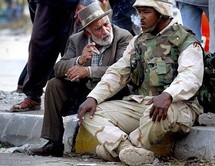Going but not forgotten: US leaves cultural imprint on Iraq
Sammy Ketz
BAGHDAD, Sammy Ketz - Sipping tea and smoking from a water pipe at Shahbander, a favoured haunt for Baghdad's intelligentsia, Jafaar Bairga neatly summed up the contradictions of Iraqi views of the United States.
"We are really inconsistent -- we express happiness when American soldiers are killed, but we dream of living in the United States because we are fascinated by their way of life," the 25-year-old diplomat said.

On the one hand, insurgents have waged a deadly campaign against what they regard as an occupying power. At the same time American culture filters through to homes across Iraq via satellite television and the Internet.
"Our style has changed: we wear lighter make-up, we put fewer products in our hair, we dress more relaxed -- even the way we smoke cigarettes or walk is different," said Shaima Ali, a 20-year-old student in her first year at Baghdad University.
Wearing a denim skirt and turquoise top, she and her friend Marwa, 21, enthusiastically reeled off a list of American movies and television shows they had watched with Arabic subtitles on Saudi television channel MBC.
The pair cited American sitcoms such as Seinfeld and Friends, musical reality show American Idol and talk show The Oprah Winfrey Show, as their favourites.
"Arab films are boring, it's always the same thing, the scenarios never change, but American movies keep us in suspense," said Shams Haytam, a biology student at Baghdad University.
"There is a sense of freedom (in American films), the women are free, it's definitely a country where I want to live."
In Baghdad's main commercial district of Karrada, 29-year-old Bashar Adnan confirmed Iraqis' passion for American movies.
"We sell 650 (American movies) every month, compared to 200 Arab movies and 50 European ones," the DVD-seller said.
"We have the top 10 American movies as soon as they are available in the United States."
By contrast, Iraqi music more than holds its own against competing artists from across the Atlantic.
Dhia Nimnim, the 33-year-old owner of Music Shop, is unequivocal in describing what her customers' tastes are: "Here, the focus is entirely on Hossam al-Rassam," a singer who focuses on the violence that has blighted Baghdad in recent years.
He is closely followed, popularity-wise, by another Iraqi artist, Majid al-Mohandes ("Majid the Engineer"): "Only the very young like rap and we sell 20 CDs a week, but local music sells three times as well," Nimnim said.
When it comes to dress sense, despite Iraqi protestations to the contrary, an American influence is visible.
"It's been six years since they came here, but they don't dictate trends, unless you're interested in military-style clothes," said Oum Nour, who owns five denim stores for women across Baghdad.
But she admitted that "American and Turkish television series dictate demand for us.
"We have to pay attention to them, to make sure that when one of them finishes, you are ready with your stock of jeans identical to those worn by the actresses," the 40-year-old owner of Khawla Fashion said.
It is much the same in Sadr City, the former stronghold of the feared Shiite militia of radical anti-US cleric Moqtada al-Sadr, where short trousers are popular.
"The first time I wore them, someone from the Mahdi Army criticised me for indecency," said Ali, a photographer.
"Six months later, he was wearing them."
Hair salons are seeing similar signs of creativity from their patrons -- Hussein, a barber for 22 years who is dubbed Obama Hussein for his resemblance to the US president, said youngsters "come to me for a Spiky or a Spiral, hairstyles they see in magazines."
The US government has made a far more limited contribution to Iraq's cultural life. A US embassy official said its services had focused "on science books and English novels."
"We have produced Arabic editions of a (William) Faulkner novel and another by (John) Steinbeck here in Iraq," the official told AFP, referring to two of America's leading 20th century novelists.
Painter Qassem Sabti, who owns a gallery in Waziriyah in north Baghdad, said that ironically, despite the bloodshed, the US military presence had enriched Iraq's arts scene.
"They brought death and destruction," he said.
"But these negative elements have been positive for me and for other artists. Painting has become more serious, more mature and, maybe, better than under Saddam Hussein."
------------------------------------------------------------------------------------------------------------